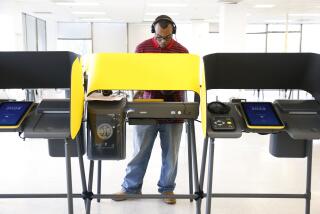Seeking a Presidential Loophole in Blanket Primary Law
Computers, the source of one gargantuan Y2K problem, may help solve another.
The so-called millennium bug, or Y2K problem, involves the coding that runs many computer programs. Unless rewritten, these codes will interpret the year 2000 as “00,” which could mean either 1900 or 2000. Havoc is feared.
But California has a unique Y2K problem, involving the 2000 presidential primaries. No one expects havoc, but it has turned into quite a headache.
By adopting a so-called blanket primary--allowing any voter to cast a ballot for any candidate, regardless of party--California stands in violation of rules set by the national Democratic and Republican parties. The practical effect: California voters could be sidelined in picking delegates who will select the major party presidential nominees in 2000.
The solution proposed by Secretary of State Bill Jones, the state’s chief elections officer: Code the ballots so that voters can still choose any candidate they like, but results can be tallied strictly by party.
“We’re doing our best to try to ensure that California’s vote will count,” said Alfie Charles, a spokesman for Jones. “The early indications are very positive.”
Indeed, leaders of the state Democratic and Republican parties, working together to solve the problem, have both expressed support for Jones’ plan and received encouragement from their national counterparts. “Everyone’s in agreement we can resolve this,” said Bob Mulholland, a consultant to the state and national Democratic parties.
The problem goes back to Proposition 198, the blanket primary initiative approved by California voters in March 1996. The free-for-all voting system was first used in the June primary, allowing thousands of voters to cross party lines and pick their favorites without regard to party registration. The measure does not specifically address the matter of apportioning presidential primary delegates.
National party rules, however, require that only party members participate in their primaries to select national convention delegates--the ones who will officially nominate the parties’ choices for president.
A remedy was presented to California voters on the Nov. 3 ballot: Proposition 3 would have brought the state into compliance in time for the March 2000 primary by suspending the blanket system in presidential election years. But voters rejected the measure 54% to 46%.
Back to Square 1.
Various scenarios were pondered and each found wanting: choosing delegates at closed-party conventions (too exclusionary); choosing delegates at tens of thousands of neighborhood caucuses (too unwieldy); choosing delegates through party-only mail balloting (a logistical nightmare).
The computer-coding solution was reached when someone--it’s unclear who--recalled that each party elected its central committee members in the June primary through a similar balloting system. At that time, voters received ballots that included the assorted candidates for governor and the like, as well as a slate of state party central committee candidates (each party’s governing executives).
Local election officials then tallied those results separately, so that only Democratic votes counted toward the race for Democratic Central Committee, and so on.
“Unbeknownst to anybody, they came up with the solution we were looking for,” said Mulholland.
Sen. Steve Peace (D-El Cajon) has drafted legislation to allow for computer-coded balloting in March 2000. Charles, the spokesman for Jones’ office, said the state would compensate the 58 counties for the cost of reprogramming their computers to allow for the dual tabulations. He said the cost is uncertain.
Senate President Pro Tem John Burton (D-San Francisco) intends to introduce his own bill that would create dual presidential primaries--one open, one closed--allowing voters to cast ballots expressing their candidate preferences, regardless of party, then vote a second time for delegates to their respective party’s nominating convention.
But Burton said he was amenable to compromise. “There’s no pride of authorship . . . “ Burton said. “Bill’s got one viewpoint and I’ve got another. . . . Whatever works is fine.”
The state Democratic and Republican parties have until next summer to come up with a solution that satisfies the national parties in time for the 2000 nominating process.
The two state parties have joined in a federal lawsuit to overturn Proposition 198 and reinstate the old voting system. A federal judge upheld the law in November 1997, but an appeal is pending, with a decision expected by next spring.
In case Proposition 198 is nullified, the Jones proposal includes a provision to drop the computer-coded system and revert to the way balloting used to be conducted, with only Republicans voting in the Republican primary and Democrats voting in their primary.
Independents and voters who decline to state a party preference would be excluded from participating in partisan primaries, just as they were before the state’s June primary.
More to Read
Get the L.A. Times Politics newsletter
Deeply reported insights into legislation, politics and policy from Sacramento, Washington and beyond. In your inbox three times per week.
You may occasionally receive promotional content from the Los Angeles Times.











